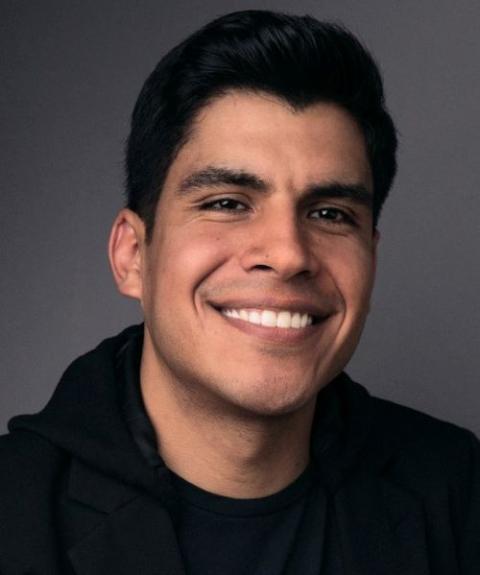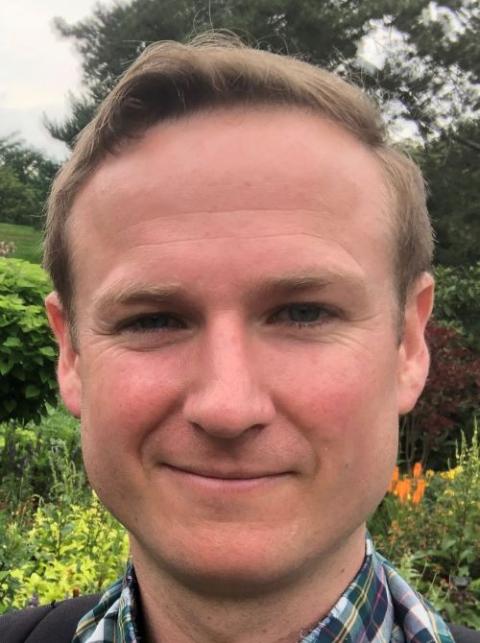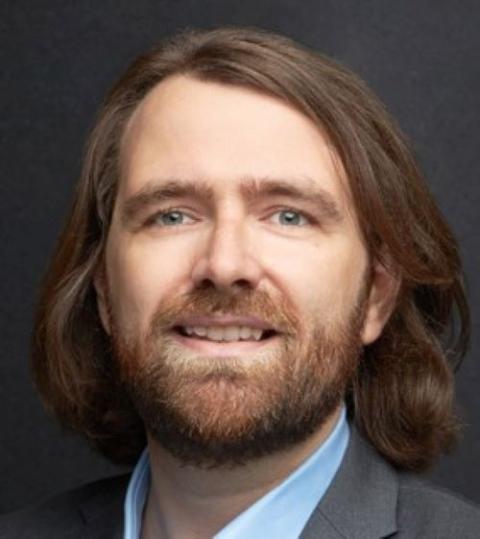
Tyler Green, preparedness help manager with the Mecklenburg County Public Health Department, talks to volunteers at a monkeypox vaccination clinic in Charlotte, N.C., Aug. 20. (AP/Nell Redmond)
On a trip to New York City for Outreach 2022, a conference on LGBTQ+ Catholic ministry, Eder Díaz Santillan saw a tweet from a gay man in the city about how he had gotten monkeypox. Díaz thought about the gay bar he had just left and became anxious about his potential exposure to monkeypox.
As he searched for information about the virus and vaccinations, he "realized that everything was chaos." In that "micro panic," Díaz, who uses both he and they pronouns, reached out to friends who worked at relevant nonprofits, but "nobody could give me any information," they said.
Díaz eventually was able to get vaccinated in late August, but they said the experience reminded them "of the fear that is still ingrained in me about talking about these issues and the judgment that might come from it from a broader society."
He said he didn't consider reaching out to Catholic spaces for support. "I would never feel comfortable telling my spiritual adviser I think I got monkeypox on a trip to New York, and I don't know where to find support. It's still a conversation that would be really hard for me," Díaz said.

Before Eder Díaz Santillan got a monkeypox vaccine, he experienced a "micro panic" about how he'd get information about the disease, (Courtesy of Eder Díaz Santillan)
Díaz and many other Catholic LGBTQ+ people in the U.S. are navigating concerns about monkeypox infections and wondering who they might turn to should they need help or have questions about the virus. While issues of LGBTQ+ inclusion in the Catholic Church have changed since the HIV/AIDS crisis, many LGBTQ+ Catholics still face challenges in finding support in their churches during another national public health crisis that disproportionately impacts men who have sex with men.
Monkeypox is a virus that spreads through skin-to-skin contact, respiratory secretions and touching objects or fabrics used by someone with monkeypox. Infections are rarely fatal, but they are frequently quite painful. The Centers for Disease Control and Prevention has confirmed at least 21,985 cases of monkeypox in the U.S.
The CDC recommends people who contract monkeypox isolate for the duration of their illness, about 2-4 weeks. The World Health Organization, or WHO, is currently in the process of renaming monkeypox because of concerns that the name evokes racist stereotypes.
According to the Centers for Disease Control and Protection, 94% of people who have gotten monkeypox in the U.S. "reported recent male-to-male sexual or close intimate contact."
Dr. Garfield A. D. Clunie, president of the National Medical Association, told NCR in an email: "This virus is not always transmitted through sexual contact and is not specific to the LGBTQA+ community. Based on the CDC information, anyone could be at risk."
While many LGBTQ+ Catholics said that they had not heard monkeypox discussed in Catholic spaces, Jason Steidl Jack, an assistant teaching professor of religious studies at St. Joseph's University, New York, said that his parish, the Church of St. Paul the Apostle in Manhattan, has included information about monkeypox and vaccines in their newsletter and on a billboard outside the parish. "It meant a lot that my parish was focusing on these issues," he said.

Jason Steidl Jack (Courtesy of Jason Steidl Jack)
However, when asked about the potential for seeking pastoral support for a monkeypox infection at his parish, Steidl Jack said: "Thank God I haven't had monkeypox, but even if I did, I wouldn't tell my parish community. I wouldn't tell my priest because there is so much stigma around it."
While monkeypox is not necessarily transmitted sexually, Díaz and Steidl Jack said that the church's inability to address sexual health in LGBTQ+ communities continues to hinder effective ministry.
"In my experience, as a gay Catholic theologian, as a minister myself, as an advocate, it is impossible to speak openly and honestly about the sexual lives of gay men, of queer folks more broadly, in the Catholic church. We can't be honest about it," Steidl Jack said.
While monkeypox cases in the U.S. have begun to decline, racial disparities in infections continue to grow, compounded by racial disparities in vaccination and treatment. Black people made up 38% of infections the week of Sept. 3, despite being only 12% of the U.S. population. The same week, Latinos made up 28% of infections, while only representing 19% of the U.S. population.
"I think we have a long way to go to meeting the needs of queer people of color, especially queer Catholics of color, who feel that there are two very prominent, structural evils that are impacting their lives," said Craig Ford, assistant professor of theology and religious studies at St. Norbert College, referring to racism, and homophobia and transphobia.
Yunuen Trujillo, religious formation coordinator with the Catholic Ministry with Lesbian and Gay Persons, an official ministry of the Los Angeles Archdiocese, saidt: "Our struggles are invisible to the (institutional) church. We are usually not considered a vulnerable population by church authorities."
Trujillo made a distinction between these attitudes in the institutional church and the more inclusive attitudes of many lay people and catechists, who she said are closer to LGBTQ+ people.
'The church not only has the responsibility to reach out to us pastorally as socially marginalized groups, but it has a particular responsibility because of its own role in that marginalization.'
— Nicholas Hayes-Mota
Trujillo pointed to a document created by the U.S. bishops' conference opposing the 2019 Equality Act, a bill that would amend the Civil Rights Act of 1964 to prohibit discrimination on the basis of sex, sexual orientation and gender identity. The bishops' document said " 'LGBT' people are not subject to systemic discrimination on the scale that has historically warranted the creation of a new federal policy."
The document went on to cite studies about the professional and financial success of LGBTQ+ people, which Trujillo said did not include the experiences of LGBTQ people of color or LGBTQ+ people who have experienced marginalization due to income, migration status, language, disability or education.
For someone diagnosed with a monkeypox infection, following the CDC guidance to isolate and remain away from the workplace can cause substantial economic harm.
Dr. Jorge Parada, medical director and committee chair of infection control and protection at Loyola Medicine, a regional health system in suburban Chicago, said that, while COVID-19 has shown how many people are already resistant to isolating due to illness, following monkeypox isolation guidelines may not be financially feasible for some. "A lot of people just can't not work for three, four weeks," he said.

Nicholas Hayes-Mota said shame "is a fundamental challenge for a lot of members of the LGBTQ community." (Courtesy of Nicholas Hayes-Mota)
Díaz also said that as a Catholic he had feelings of shame, both about needing to look for the vaccine and the potential that he could have exposed his family and friends to monkeypox.
"That shame of being a gay man, who also has sex, I will forever attribute to the church," Díaz said.
For Nicholas Hayes-Mota, a doctoral candidate and teaching fellow in theological ethics at Boston College, this shame illustrates precisely why LGBTQ+ people need more pastoral support from the church.
Shame "is a fundamental challenge for a lot of members of the LGBTQ community. It often comes from continuous external messages, how we're told to think about ourselves by the rest of the world. But then we internalize it too, and it becomes kind of our own worst enemy. That's been a big part of my life," Hayes-Mota said.
"To the extent that particular interpretations of Catholic teaching, voices in the institutional Catholic church have contributed to that (shame)" he said, "I think the church not only has the responsibility to reach out to us pastorally as socially marginalized groups, but it has a particular responsibility because of its own role in that marginalization."
Advertisement
St. Norbert College's Ford suggested that Catholic institutions should seek to be "places of safety."
He said they should be "places where we withhold judgment and places where people can ask for and expect God's healing both at a personal level, but also at a spiritual level."
Francis DeBernardo, executive director of New Ways Ministry, said the Christian message "is about the human dignity of all people, and the way to respond to that human dignity is through love."
"Jesus in the Gospels is often misunderstood when he stands with those who are marginalized in society," DeBernardo said, "but he went through with it."








